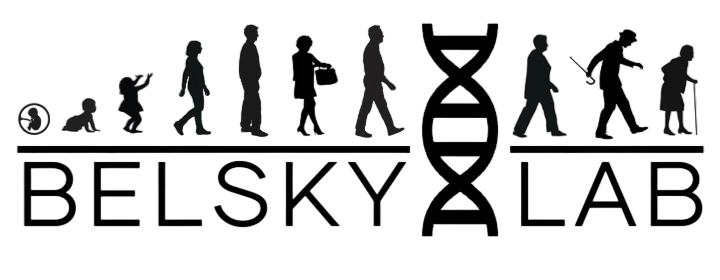Our Vision is Population Geroscience
We believe insights into the basic biology of aging have transformative potential for public health. We work to bring breakthroughs from aging biology into public health with the goal of increasing healthy lifespan for all. Our research seeks to understand how genes and environments combine to shape health across the life course, with the long term goal to identify opportunities for policy, clinical, and public health intervention to promote positive development in early life and extend health across the lifespan.
Daniel W. Belsky, PhD.
Associate Professor of Epidemiology
Columbia University Mailman School of Public Health and Butler Columbia Aging Center
Education
BA Swarthmore College, Psychology
PhD University of North Carolina at Chapel Hill Gillings School of Public Health, Department of Health Policy & Management
Postdoctoral Fellowship Duke University Center for the Study of Aging and Human Development, with Terrie Moffit and Avshalom Caspi
Introduction
Dan is an Associate Professor of Epidemiology at the Columbia University Mailman School of Public Health and the Butler Columbia Aging Center, where he directs the Center’s Geroscience Computational Core. He was an Early-Career Fellow of the Jacobs Foundation and is a current Fellow of the Canadian Institute for Advanced Research (CIFAR). He is a Scientific Advisory Board Member for the Xprize for Healthspan Extension and the Biomarkers of Aging Consortium. Prior to coming to Columbia, Dan was Assistant Professor in the Departments of Medicine and Population Health Sciences at the Duke University School of Medicine, where he previously completed a postdoctoral fellowship at the Center for the Study of Aging and Human Development, with Terrie Moffit and Avshalom Caspi. Dan earned his BA from Swarthmore College and his PhD from the UNC Gillings School of Global Public Health.
Dan works at the intersection of the social and behavioral sciences, genomics, and public health. His focus for the past several years has been on development and evaluation of methods to quantify the pace and progress of biological process of aging in young, mid-life, and older-adult humans and the application of these methods to study (1) how life-history and social factors contribute to individual differences in healthy aging; and (2) whether and how aging processes can be modified by intervention. With collaborators Terrie Moffitt and Avshalom Caspi he originated the Pace of Aging method to quantify the aging process from longitudinal analysis of human physiology and recently translated this method into a DNA-methylation blood test that can be implemented from a single time point of data collection. He is principal investigator of NIH-funded projects to test how caloric restriction may slow or reverse aging-related changes to the genome (CALERIE), to understand long-term impacts of in-utero famine exposure on biological aging (Dutch Hunger Winter Family Study, with Bertie Lumey), and to test the potential of anti-poverty policy intervention to slow biological aging (MyGoals for Healthy Aging, with Peter Muennig).
Dan’s Google Scholar, Twitter, Email, Wikipedia, and CV.
Current Projects




